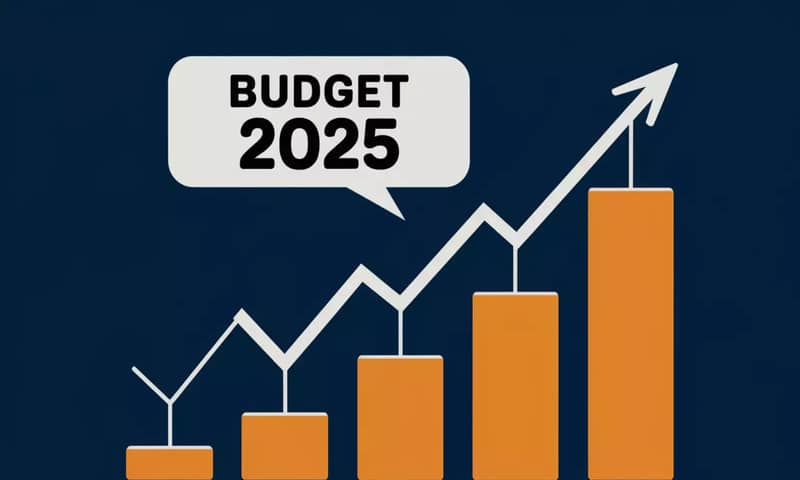Anticipated Changes in Budget 2025 Income Tax

As the Union Budget 2025 approaches, taxpayers across India are eagerly awaiting potential changes to the income tax regime. The government is under pressure to address rising living costs and inflation, which have significantly impacted consumer spending. This budget is particularly crucial for individual taxpayers, who have high expectations for reforms that could ease their financial burdens. With a focus on simplifying tax provisions and stimulating economic growth, the upcoming budget could introduce several key changes that may benefit taxpayers.
Increased Income Tax Rebate
One of the most anticipated changes in the Budget 2025 is the potential increase in the income tax rebate. Currently, taxpayers enjoy a full tax rebate on taxable income up to Rs 7 lakh. However, there are strong expectations that this limit could rise to Rs 10 lakh. Such an adjustment would provide substantial relief to middle-income earners, allowing them to retain more of their earnings. This increase could encourage higher consumer spending and investment, which is vital for economic recovery.
The finance minister has previously made significant changes to the income tax regime to attract more taxpayers. By raising the rebate limit, the government would not only alleviate financial pressure on individuals but also stimulate demand in the economy. This move could be particularly beneficial in the current climate of high inflation, where many households are struggling to make ends meet. Overall, an increased income tax rebate could serve as a catalyst for economic growth, benefiting both taxpayers and the broader economy.
Enhanced Deductions Under Sections 80C and 80D
Another area where taxpayers are hoping for change is in the limits for deductions under Sections 80C and 80D of the Income Tax Act. For over a decade, the deduction limit under Section 80C has remained stagnant at Rs 1.5 lakhs. Given the rising cost of living and inflation, there is a strong case for increasing this limit to Rs 3 lakhs. Such a change would allow taxpayers to claim higher deductions for investments in specified savings instruments, thereby reducing their taxable income.
Similarly, the limit under Section 80D, which pertains to medical insurance premiums, is also due for a revision. Currently, the deduction limit stands at Rs 25,000 for individuals and Rs 50,000 for senior citizens. With healthcare costs soaring, there is a pressing need to increase these limits. Taxpayers are hopeful that the government will consider allowing medical insurance premiums as a deduction under the new tax regime as well. This would not only provide financial relief to individuals but also encourage them to invest in health insurance, promoting better health outcomes across the population.
Housing Tax Breaks to Stimulate Real Estate
The real estate sector has been a critical area of focus for the government, especially in light of the “Housing for All” initiative. To further stimulate this sector, taxpayers are expecting an increase in tax benefits for homebuyers. Currently, the overall limit to claim losses under the head “income from house property” is restricted to Rs 2 lakhs per annum. Many believe this limit should be raised to Rs 3 lakhs per annum to provide additional support to homebuyers.
Moreover, there is a call for enhanced deductions on home loan interest and principal repayments. By increasing these deductions, the government could incentivize more individuals to invest in real estate, which would, in turn, boost the economy. A thriving real estate market can create jobs, stimulate construction, and contribute to overall economic growth. As the budget date approaches, stakeholders in the housing sector are keenly watching for any announcements that could impact homebuyers and the broader real estate market.
Simplifying TDS Processes for Non-Resident Sellers
The current tax deduction at source (TDS) process for buyers purchasing immovable property from non-resident sellers is often seen as cumbersome. Presently, buyers must obtain a Tax Deduction and Collection Account Number (TAN) for a one-off transaction, deduct tax at a higher rate, and file a TDS return. This process can be complex and time-consuming, deterring potential buyers.
To simplify this, there are calls for the government to introduce a more straightforward challan-cum-statement process for non-resident sellers, similar to what is currently in place for resident sellers. Streamlining this process would not only make it easier for buyers but also encourage more transactions in the real estate market. By reducing bureaucratic hurdles, the government could facilitate smoother property transactions, ultimately benefiting both buyers and sellers.
As the Budget 2025 approaches, the expectations from individual taxpayers are high. The government has a unique opportunity to set the tone for economic recovery through thoughtful policy announcements. With the right measures, the upcoming budget could significantly impact the financial landscape for millions of taxpayers across the country.
Observer Voice is the one stop site for National, International news, Sports, Editor’s Choice, Art/culture contents, Quotes and much more. We also cover historical contents. Historical contents includes World History, Indian History, and what happened today. The website also covers Entertainment across the India and World.

